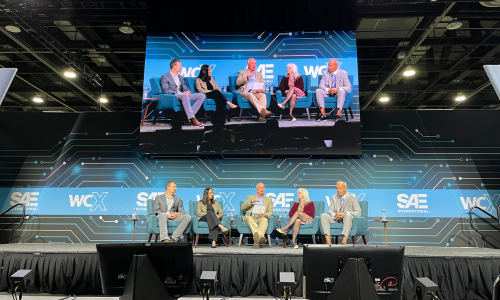Former GM Powertrain Expert Andy Jeffers Hosts Panel at WCX to Discuss the Future of Standards Post- SAE J3400 (NACS)
Posted: April 24, 2024
Since the development of Tesla’s North American Charging Standard (NACS)—being standardized now as SAE J3400—standardization has become a hot topic in the mobility industry.
Former GM Powertrain Expert Andy Jeffers sat down with Intel’s Rebecca Delgado, Toyota’s James Flaherty, the US Department of Energy’s Sarah Hipel, and SAE International’s Christian Thiele on the final day of WCX 2024 to discuss this topic.
Jeffers opened the panel discussion by asking if the conversation around SAE J3400 is an indicator of more collaboration versus competition within the industry.
The group agreed that the mobility industry has always benefitted from standards. Delgado noted that there are several advantages that come with competitiveness between industry partners, while Thiele described how standards create these sorts of “black box environments,” where creativity and collaborative harmony come from neutral starting points.
That collaboration is a crucial part of what makes innovation possible and was important to all panelists when considering the evolution of charging standards.
“When the J3400 news broke, I was initially worried that we would lose collaborative standards; no one thought we would be able to get J3400 to a workable position. Tesla, however, came forth saying that they wanted to have collaboration take place,” Hipel said.
The talk turned to the responsibility industry shapers have to create a shared source of information for professionals to draw from.
Flaherty specifically mentioned the large need for standardization regarding software-defined vehicles, and how software costs are becoming more and more intertwined with automotive costs. Delgado seconded this statement.
“We can make a lot of individual progress, but if we don’t come together, we’ll keep facing parallel financial costs. We can’t afford these challenges single-handedly.” she said.
Thiele emphasized the importance of scalability within in the mobility industry—and how standards lead to more scalable processes.
“You take the cost out of the system by bringing engineers together to remove costly and ineffective factors,” he said.
No matter what, consensus is needed to work together in a way that is beneficial for all. A good standard, according to the panel, has clearly-identified priorities, agreed dependencies, and value-focused content.
Cross-industry collaboration outside of the automotive industry for solutions could lead to breakthrough moments, as well.
“I think we can accelerate quicker if we share,” Hipel said. “Standards serve as a roadmap to progress.”
